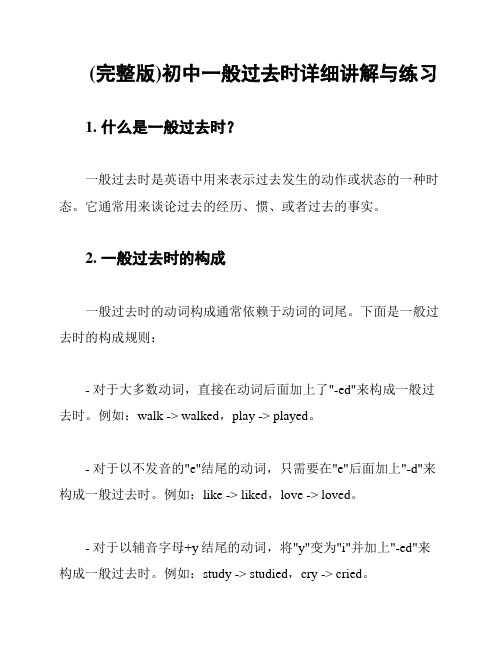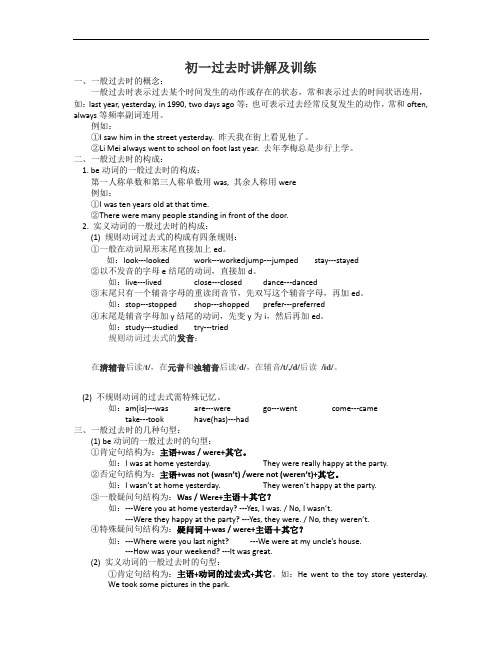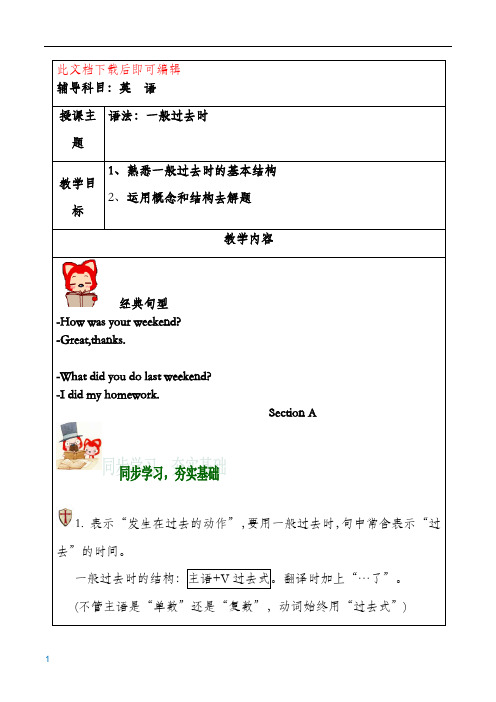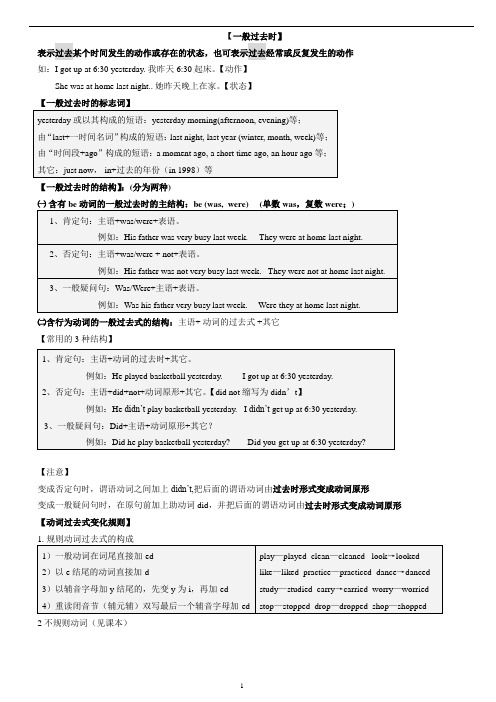(完整word版)初一下一般过去时讲解及训练
(完整版)初中一般过去时详细讲解与练习

(完整版)初中一般过去时详细讲解与练习1. 什么是一般过去时?一般过去时是英语中用来表示过去发生的动作或状态的一种时态。
它通常用来谈论过去的经历、惯、或者过去的事实。
2. 一般过去时的构成一般过去时的动词构成通常依赖于动词的词尾。
下面是一般过去时的构成规则:- 对于大多数动词,直接在动词后面加上了"-ed"来构成一般过去时。
例如:walk -> walked,play -> played。
- 对于以不发音的"e"结尾的动词,只需要在"e"后面加上"-d"来构成一般过去时。
例如:like -> liked,love -> loved。
- 对于以辅音字母+y结尾的动词,将"y"变为"i"并加上"-ed"来构成一般过去时。
例如:study -> studied,cry -> cried。
- 部分动词的一般过去时需要进行不规则变化。
例如:go -> went,eat -> ate。
3. 一般过去时的用法一般过去时通常用来描述以下情况:- 过去发生的动作:I walked to school yesterday.- 过去的经历:He lived in London for five years.- 过去的事实:She was a teacher in the past.4. 一般过去时的句型练下面是一些练,帮助加深对一般过去时的理解和运用:1. 请用一般过去时填空:Yesterday, I ________ (watch) a movie at home.2. 完成句子:He _____ (visit) his grandparents last summer.3. 改写句子,使用一般过去时:I read a book yesterday. (改为否定句)4. 改写句子,使用一般过去时:They played basketball in the park. (改为疑问句)5. 总结一般过去时是用来表示过去发生的动作或状态的一种时态。
初一年级英语一般过去时详细讲解和练习

用括号里动词的适当形式填空.
1. He __re_a_d______ <read> that book last week.
arrived
2. Last nimgahrtrihede ___________ <arrive> just in time for the show. showed 3. Mary ___________ <marry> Thomas yesterday.
2. live 5. hope 8. finish 11. go 14.get 17.see 20.take
3. stop 6. trip 9. want 12.have 15e 18.put 21.read
答案
1. look looked 2. live lived 3. stop stopped
4. carry carried 5. hope hoped 6. trip tripped
7. call called 8. finish finished 9. want wanted
10.are were 11.go went 12.have had
13.do did 14.get got 15e came
句型构成 ①含有be动词的一般过去时 <单数was 复数were>
肯定句: 主语 + was / were+其他.
否定句: 主语 + was / were + not+其他. was not =wasn’t were not = weren’t
一般疑问句及其答语: was / were + 主语 +其他成分? Yes , 主语+ was / were. No ,主语+ wasn’t/ weren’t.
7下一般过去时讲解及训练

初一过去时讲解及训练一、一般过去时的概念:一般过去时表示过去某个时间发生的动作或存在的状态,常和表示过去的时间状语连用,如:last year, yesterday, in 1990, two days ago等;也可表示过去经常反复发生的动作,常和often, always等频率副词连用。
例如:①I saw him in the street yesterday. 昨天我在街上看见他了。
②Li Mei always went to school on foot last year. 去年李梅总是步行上学。
二、一般过去时的构成:1. be动词的一般过去时的构成:第一人称单数和第三人称单数用was, 其余人称用were例如:①I was ten years old at that time.②There were many people standing in front of the door.2. 实义动词的一般过去时的构成:(1) 规则动词过去式的构成有四条规则:①一般在动词原形末尾直接加上ed。
如:look---looked work---worked j ump---jumped stay---stayed②以不发音的字母e结尾的动词,直接加d。
如:live---lived close---closed dance---danced③末尾只有一个辅音字母的重读闭音节,先双写这个辅音字母,再加ed。
如:stop---stopped shop---shopped prefer---preferred④末尾是辅音字母加y结尾的动词,先变y为i,然后再加ed。
如:study---studied try---tried规则动词过去式的发音:在清辅音后读/t/,在元音和浊辅音后读/d/,在辅音/t/,/d/后读/id/。
(2) 不规则动词的过去式需特殊记忆。
如:am(is)---was are---were go---went come---cametake---took have(has)---had三、一般过去时的几种句型:(1) be动词的一般过去时的句型:①肯定句结构为:主语+was / were+其它。
(完整版)中学一般过去时详细讲解与练习

(完整版)中学一般过去时详细讲解与练习一般过去时的使用一般过去时是英语中表示过去发生的动作、状态或惯的一种时态。
在一般过去时中,动词的过去式形式通常用来表示过去的时间。
以下是一般过去时的使用情况:1. 表示过去发生的动作一般过去时可以用来表示过去已经完成的动作。
例如:- He played soccer yesterday.(他昨天踢足球。
)- She went to the beach last weekend.(她上周末去了海滩。
)2. 表示过去的状态或特征一般过去时也可以用来描述过去的状态或特征。
例如:- They were happy when they received the news.(当他们收到那个消息时他们很开心。
)- The house was big and beautiful.(那个房子又大又漂亮。
)3. 表示过去的惯一般过去时还可以用来表示过去经常性的动作或惯。
例如:- I always ate breakfast before going to school.(我过去上学前总是吃早餐。
)- She often went for a run in the evening.(她过去经常在晚上去跑步。
)一般过去时的构成与规则动词变化- 对于大多数动词,一般过去时的构成是在动词原形后面加上-ed。
例如:play → played, work → worked。
- 对于以e结尾的动词,只需要加-d。
例如:live → lived。
- 对于以辅音字母+y结尾的动词,将y变为i然后加-ed。
例如:study → studied。
- 对于以辅音字母结尾的重读闭音节动词,重读闭音节的辅音字母要双写,再加-ed。
例如:stop → stopped。
- 一些动词的过去式形式是不规则的,需要特殊记忆。
例如:go → went, eat → ate。
一般过去时的练以下是一些练,帮助你巩固一般过去时的使用和动词形式变化:1. Fill in the blanks with the correct past tense form of the verbs:- She __________ (watch) a movie last night.- They __________ (visit) their grandparents on the weekend.- He __________ (study) math for two hours yesterday.2. Rewrite the sentences in the past tense:- I go to school every day. (改为过去时)- Jane plays tennis on Saturdays. (改为过去时)- We eat pizza for lunch. (改为过去时)- She __________ (go/went) to the party last night.- We __________ (see/saw) a movie at the cinema.- He __________ (run/ran) in the race and won.请根据上述讲解和练习进行学习和练习,巩固中学一般过去时的用法和动词形式变化。
七年级下册一般过去时讲解及练习题(完整资料).doc

此文档下载后即可编辑辅导科目:英语授课主题语法:一般过去时教学目标1、熟悉一般过去时的基本结构2、运用概念和结构去解题教学内容经典句型-How was your weekend?-Great,thanks.-What did you do last weekend?-I did my homework.Section A1. 表示“发生在过去的动作”,要用一般过去时,句中常含表示“过去”的时间。
一般过去时的结构:主语+V过去式。
翻译时加上“…了”。
(不管主语是“单数”还是“复数”,动词始终用“过去式”)练:(1) He _________ (go) to school on foot yesterday.(2) – What did Jim do?-- He _________ (go) to the movies.(3) We ___________ (not go) to the cinema last Sunday.2. –你上个周末做了什么?-- What did you do last weekend? (did 引导,动词还原)--在星期天上午,我打了网球。
-- I played tennis on Sunday morning.拓展:时间前的介词用什么在上午/下午/晚上:in the morning/afternoon/evening在星期天上午/下午/晚上:on Sunday morning/afternoon/evening 在上个星期天上午:/ last Sunday morning (前不用冠词)在上学的白天/晚上:on school days/nightson weekends 在周末on weekdays 在工作日3. –Tina的周末怎么样?-- How was Tina’s weekend?--它很棒:It was great.–它还不错:It was not bad.–它很糟糕:It was terrible.。
完整word版七年级下册一般过去时讲解及练习题

辅导科目:英语授课主题语法:一般过去时1、熟悉一般过去时的基本结构教学目标运用概念和结构去解题2、教学内容经典句型-How was your weekend?-Great,thanks.-What did you do last weekend?-I did my homework.Section A的时间。
过去”“表示发生在过去的动作”,要用一般过去时,句中常含表示“1. ”。
+V过去式。
翻译时加上“…了一般过去时的结构:主语”)过去式复数“”,动词始终用“还是单数不管主语是(“”(1) He _________ (go) to school on foot yesterday.练:–(2) What did Jim do?1-- He _________ (go) to the movies.(3) We ___________ (not go) to the cinema last Sunday.) (did引导,动词还原-- What did you do last weekend? 2. –你上个周末做了什么?-- I played tennis on Sunday morning. --在星期天上午,我打了网球。
拓展:时间前的介词用什么in the morning/afternoon/evening/晚上:在上午/下on Sunday morning/afternoon/evening晚上下在星期天上午) 前不用冠词( / last Sunday morning 在上个星期天上午:on school days/nights 晚上:在上学的白天/ 在工作日on weekdays 在周末on weekendsHow was Tina's weekend?Tina的周末怎么样?-- 3. –It was great. --它很棒: not bad.–它还不错:It was terrible.它很糟糕:It was–( ) 1--_____you busy last weekend?--Yes, I helped my mother clean the house and the garden.A WereB WasC DidD Are2( ) 2–What did they do last weekend?-- They _______in the park.A went a boatB went to a boatC went boatingD took boating ( ) 3-How many ____did you see on the farm?A sheepsB sheepC cowD chicken( ) 4 –Did you have a good weekend?---Yes ,it was good. But I was kind of ______.A interestedB happyC tiredD excited( ) 5 Mary _____very late last night .A stayed upB sat downC woke upD put down( ) 6 Mike _____ in the swimming pool yesterday.A swimedB swimmedC swamD swims( ) 7 There isn't ________ in the restaurant .A something deliciousB anything deliciousC everything expensiveD nothingexpensive( ) 8 The movie was ______ but ______.A interested ; scaredB interested ; scaryC interesting ; scaredD interesting ;scary( ) 9 Did you see the boy _____ soccer on the playground just now ?A playedB playsC playingD to play语法一般过去式His mother made some dumplings yesterday. 用法: ①过去某个时间发生的动作例:1Jim was 12 years old.例:②过去某个时间存在的状态③过去经常或反复发生的动作例:He often went to swim when he was a child.2. 与一般过去时连用的时间状语常见的有:Yesterday, last night, in 1990, once, two days ago, the day before yesterday , the 3other day 几天前一般过去时的四个基本句型 3.dobe谓语动词是谓语动词是TV yesterday. in the room yesterday. watched They He was肯定句TV yesterday.He was not in the room didn't watch They 否定句yesterday.TV yesterday? Was he in the room yesterday?Did they watch一般疑句did.didn't.No, they Yes, he was. No, he wasn't. Yes, theythey do yesterday?Where was he yesterday?What did 特殊疑问句4. 动词的过去式和过去分词的规则变化例: want →wanted ①一般在动词词尾加edd e: live →lived 例结尾的动词,只加②以ed i,再加例: study →studied ③以辅音字母加y结尾的动词,改y为ed ④以重读闭音节结尾,末尾只有一个辅音字母,双写这一辅音字母,再加: stop →stopped例.不规则动词过去式:5 give-gave, see--saw, say-said, am,is--was, are--were, do--did,take-took, eat-ate, come-came, have-had, get-got, go-went,fly-flew,put-put, sing-sang, run-ran,drink-drank, write-wrote, draw-drew, make-made, read-read,sit-sat sweep-swept, swim-swam, ride-rode, speak-spoke,练一练come take run go have do are becometrip stop carry hope live leave saylookcome get are want go do call finish eat see say put take read4动词一般过去时,表示过去发生的事;;were, have, has变hadbe 用was或用谓语动词过去式,过去时间坐标志;,若是特殊得硬记。
(完整版word)英语一般过去时形式讲解附答案

(完整版word)英语一般过去时形式讲解附答案一、初中英语一般过去时1.—Jerry, have you ever been to the Great Wall?—Yes. I______ there with my parents last year.A. goB. wentC. will goD. have gone【答案】B【解析】【分析】句意:—Jerry,你曾经去过长城吗?—是的,去年我和我父母一起去那儿的。
由第二句的时间标志词last year 可以理解句意为去年我和爸妈去过长城。
属于一般过去时的标志词,故选B。
【点评】本题考查动词的时态。
根据句子的时间状语确定正确的时态。
2.He almost fell down. But he _____.A. didn'tB. doesn'tC. won't【答案】 A【解析】【分析】句意:他几乎摔倒,但是他没有。
前句动词fell是fall的过去式,说明句子用的一般过去时态,后句也还是对那件事的描述,还是用一般过去时态,否定:动词前面加didn't,同时把动词变为原形。
故选A。
3.A bridge ________over the river last year.A. buildsB. builtC. was builtD. is built【答案】 C【解析】【分析】句意:去年河上建了一座桥。
主语是谓语的执行者时,用主动语态,主语是谓语的承受者时,用被动语态。
a bridge是谓语build的承受者,用被动语态;表示在last year发生的过去动作,用一般过去时态,故选C。
4.Jake _____his key in the office so he had to wait until his wife _______ home.A. has forgotten … comesB. forgot… comeC. had left… cameD. had left…would come【答案】 C【解析】【分析】句意:杰克把他的钥匙丢在办公室了,因此他不得不等到他的妻子回家。
初中英语 语法 七年级下 一般过去时讲解 解析及过关练习题

【一般过去时】表示过去某个时间发生的动作或存在的状态,也可表示过去经常或反复发生的动作如:I got up at 6:30 yesterday. 我昨天6:30起床。
【动作】She was at home last night.. 她昨天晚上在家。
【状态】【一般过去时的结构】:(分为两种)㈠含有be动词的一般过去时的主结构:be (was, were) (单数was,复数were;)㈡含行为动词的一般过去式的结构:主语+ 动词的过去式 +其它【常用的3种结构】【注意】变成否定句时,谓语动词之间加上didn’t,把后面的谓语动词由过去时形式变成动词原形变成一般疑问句时,在原句前加上助动词did,并把后面的谓语动词由过去时形式变成动词原形【动词过去式变化规则】2不规则动词(见课本)【练习】walk____ live_____ stop_____ study____ use _____ come ___ start___ worry_____ have_____ do_____ go_____tell____ see____ put____ make______ buy_____ play_____ hear_____ know_____ get_____ Lily was ten years old last year.否定句:_________________________________________一般疑问句: ______________________________They did their homework yesterday否定句:_________________________________________一般疑问句: ______________________________He went to the park last week.否定句:_________________________________________一般疑问句: ______________________________选择1.What _____they _____dinner yesterday?A. do; have forB. did; had forC. did; have forD. were; have for2.One of us ______band last month.A. leavesB. leaveC. leavedD. left3.Where _______your mother born?A. areB. wasC. wereD. is4.My mother ____________ some cakes for us last night.A. makesB. makedC. madeD.to make5.I got up _____this morning, so I _____breakfast and went to school.A. late; didn’t haveB. early; didn’t haveC. late; hadn’tD. early; hadn’t6.It ______much cold today than it _____ yesterday.A. is; isB. was; wasC. is; wasD. was; is7.He didn’t come _____goodbye to us and away.A. say; goB. say; wentC. to say; wentD. to say go8.Her pen was broken. She____ to _____a new one.A. wants; buysB. wanted; boughtC. wants; boughtD. wanted; buy9.I stayed in the sitting room and ____my friends all the time.A. talk toB. talkedC. talk aboutD. talked to10.—he go to Central Park? —Yes, he did.A. DidB. DoC. DoesD. Is11.The little girl often _______ there, last week, she _________ there, too.A. go, wentB. go, goesC. goes, goesD. goes, went。
- 1、下载文档前请自行甄别文档内容的完整性,平台不提供额外的编辑、内容补充、找答案等附加服务。
- 2、"仅部分预览"的文档,不可在线预览部分如存在完整性等问题,可反馈申请退款(可完整预览的文档不适用该条件!)。
- 3、如文档侵犯您的权益,请联系客服反馈,我们会尽快为您处理(人工客服工作时间:9:00-18:30)。
初一过去时讲解及训练一般过去时1.一般过去时表示过去某个时间发生的动作或存在的状态,常和表示过去的时间状语连用。
一般过去时也表示过去经常或反复发生的动作。
常用过去时间:yesterday, this morning, just now, a moment ago, in May, last night / year / week, once upon a time, the other day, before …, when –clause, in the past连用。
如:What did you do yesterday? 昨天你干了什么?I met Lin Tao this morning. 今天上午我会到了林涛。
I was there a moment ago. 刚才我在那儿2.Be动词在一般过去时中的变化:⑴am 和is在一般过去时中变为was。
(was not=wasn't)⑵are在一般过去时中变为were。
(were not=weren't)⑶带有was或were的句子,其否定、疑问的变化和is, am, are一样,即否定句在was或were后加not,一般疑问句把was或were调到句首。
3.句中没有be动词的一般过去时的句子肯定句:Jim went home yesterday.把动词改为过去形式否定句:didn't +动词原形,如:Jim went home yesterday.Jim didn't go home yesterday.一般疑问句:在句首加did,句子中的动词过去式变回原形。
如:Jim went home yesterday.Did Jim go home yesterday?特殊疑问句:⑴疑问词+一般疑问句?如:Jim went home yesterday.Did Jim go home yesterday?What did Jim do yesterday?动词过去式变化规则:(1) 一般在动词后加-ed。
如:play—played, offer—offered, weigh—weighed, destroy— destroyed, sign—signed.(2) 在以字母e结尾的动词后,只加-d。
如:like—liked, provide—provided, hate — hated, date—dated。
(3) 在以“辅音字母+y”结尾的动词后,则改y为i,再加—ed。
如:supply—supplied, fly—flied, study— studied.(4) 在以单短元音的重读闭音节结尾且,末尾只有一个辅音字母的动词后,双写最后一个辅音字母,再加-ed。
如:plan—planned, refer—referred, regret—regretted, ban—banned.一、单项选择:从下列各题后所给的四个选项中选择最佳答案填空。
( )1.My father______ill yesterday.A.isn't B.aren't C.wasn't D.weren't( )2 ______your parents at home last week﹖A.Is B.Was C.Are D.Were( )3.The twins______in Dalian last year.They______here now.A.are; were B.were; are C.was; are D.were; was ( )4.______your father at work the day before yesterday (前天)﹖A.Was B.Is C.Was D.Is( )5.—Who was on duty last Friday﹖—______.A.I am B.I was C.Yes, I was D.No, I wasn't二、请用正确动词形式填空。
1. I _________ (have) an exciting party last weekend.2. ---_________ she _________(practice) her guitar yesterday?---No, she _________.3. ---What ________ Tom ________ (do) on Saturday evening?---He ________(watch) TV and __________(read) an interesting book.4. They all _________(go) to the mountains yesterday morning.5. She _________(not visit) her aunt last weekend.She ________ (stay) at home and _________(do) some cleaning.三、翻译下列句子1. 我过了一个忙碌但却刺激的周末。
I _________ _________ __________ __________ exciting weekend.2. Jenny喜欢看书。
昨晚她看了一本英语书。
Jenny likes _________ __________. She _________ an English book last night.3. Emma每天都看电视。
可是昨天他没有看。
Emma__________ TV every day. But he _________ ________ ________ yesterday.4. 上周六他们做什么了?他们做作业和购物了。
What ________ they _________ _________ Saturday?They _________ __________ homework and _________ __________.5. 今天早上方方得做饭,因为他父亲不在家。
This morning Fangfang ____ ____ ____ ____ because his father _____ _____ ____ yesterday.四、改写句子:1、Lucy did her homework at home.(改否定句)Lucy ________ _______ her homework at home.2、He found some meat in the fridge(冰箱).(变一般疑问句)___________ he __________ ___________ meat in the fridge?3、There was some orange in the cup.(变一般疑问句)_______ there _______ orange in the cup?4. Frank read an interesting book about history. (一般疑问句)_______ Frank _______ an interesting book about history?5. Why not go out for a walk? (同义句)_______ ________ ________ out for a walk?五、改错题1.How is Jane yesterday? _____________________2.He go to school by bus last week. ____________________________3.He often goes home at 6:00 last month. ____________________________4.I can fly kites seven years ago. ______________________________5.Did you saw him just now. ____________________________________六、完形填空Tom did not like doing his homework,because he liked to do some 1 things after school.And his teacher always 2 a lot of mistakes in his homework.Then one day,his math teacher 3 at Tom’s homework and saw that he got all his answers right.He was very 4 and surprised(惊奇).The next morning before class,he called Tom 5 his desk and 6 to him,“You got all your homework right this time.Did your father help you?”Sometimes Tom’s f ather helped him with his homework,7 this time he didn’t help Tom because he 8 at home.So Tom answered,“NO,Sir.He Was busy last night,so I 9 to do it 10 .”()1.A.others ()2.A.made ()3.A.laughed ()4.A.please ()5.A.to()6.A.talked ()7.A.and ()8.A.isn’t ()9.A.wanted ()10.A.itself B.anotherB.foundB.knockedB.pleasedB.forB.askedB.butB.won’t beB.mustn’tB.of themC.the otherC.looked atC.lookedC.pleasureC.inC.spokeC.soC.wasn’tC.likedC.myselfD.otherD.lookedD.sawD.sadD.atD.saidD.orD.can’t beD.haveD.himself。
